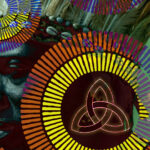In a previous article I argued that—despite some basic similarities—Christ offers Africans true hope in the face of death, which belief in the ancestors does not. For the ancestors enjoy a closer relationship with God in death, which is denied to the living. Furthermore, the living are not guaranteed that they will enjoy that privilege in death, since not everyone becomes an ancestor. Because not all Africans become ancestors, they aren’t assured of knowing and enjoying God in the afterlife.
The Christian faith offers a hope that is lacking in traditional African beliefs.
This article will advance some of those observations. We’re going to explore whether all Africans becomes ancestors in the afterlife. If they do, then every African will enjoy privileged and personal access to God. However, if they don’t, what sure hope do Africans have in death? To explore this question I will rely on the findings of John Pobee. As we go about the task it will become clear that the Christian faith offers a hope that is lacking in traditional African beliefs.
‘Must I Become an Ancestor to Meet God?’
When we compare God’s promises in Christ with the hope we have in our own traditional worldviews about the afterlife, we find great differences.
John Pobee writes, “The ancestors are those of the clan who have completed their course here in the land of the living (atseasefo) and are gone before the living to asamandow or asamande, the place of the dead, the spiritual waiting place. The Konkomba of Northern Ghana interestingly call it Uumbwardo, which literally means ‘God’s house,’ thereby depicting the dead as elder brothers of the living at the house of God. However, not all of the asaman (the dead) are ancestors.” Therefore within African Traditional Religions (ATR), only those who qualify to be ancestors enjoy being in God’s house after death.
Only those who qualify to be ancestors enjoy being in God’s house after death.
This is consistent with the belief that the ancestors are the mediators between God and the living. Because only some Africans become ancestors to mediate, not every African is guaranteed to enter God’s house in death. A gap remains, forever. There is a chasm between many Africans and God that isn’t closed in death. Though this is considered normal for the living, its implications are rarely explored for the deceased. Not everyone can enter God’s house. Not even in death.
But God seeks to close this gap between himself and his people through Christ. Though Christ, God makes us his children (John 1:12), members of his household (Ephesians 2:19), co-inheritors with the Son of God (Romans 8:17). Christ qualifies us for entrance into God’s house, approaching him like children (Ephesians 1:5).
Christ’s Invitation is for Everyone, Even the Young
In Christ God is reconciling the world to himself (2 Corinthians 5:19) and the church is the vehicle by which he extends this invitation (2 Corinthians 5:20). Yet some might say, ‘We have the hope to become ancestors, this gives us the hope to be in God’s house, therefore we do not need Christ.’ In response to this objection we must closely look at what the qualifications for an African to become an ancestor. When we do this, the odds for many of us qualifying are low.
Regardless of age, Christ is our sure hope.
For starters, none of us has the hope of being an ancestor until reaching a certain age. For “an ancestor is the one who lived to a ripe old age.” Therefore, until that ripe old age, none of us has the hope of being in God’s house. But when we look to Christ we have this hope. Regardless of age, Christ is our hope of glory (1 Colossians 1:27).
Even children can hope to enter God’s house after death. As Peter preached on the day of Pentecost, “The promise is for you and for your children and for all who are far off; everyone whom the Lord our God calls to himself” (Acts 2:39). Therefore, unlike traditional beliefs, hope in Christ does not have age restrictions.
You Don’t Have to be a Good Person
Besides the age restriction, within African traditional religions only those who have lived an exemplary life become ancestors. Pobee says that the ancestor is “one who lived to a ripe old age and in an exemplary manner or did much to enhance the prestige and standing of the family, clan, and tribe.” This means that even if we live to a ripe old age, can we really call our lives exemplary? If we can’t, we don’t qualify to enter God’s house.
If we can’t call our lives exemplary, we don’t qualify to become ancestors and enter God’s house.
How many of us can say we are living exemplary lives? So Pobee continues, “The man who in life was morally bankrupt is disqualified from being an ancestor.” If I’m honest, I know that I don’t meet this moral requirement. But this is where the Christian faith is markedly different: God is gracious. Through faith in Christ we become God’s righteousness (2 Corinthians 5:21), his children (John 1:2). He is our qualification to be in God’s house. None of us have to, nor can we, earn our way into God’s house. Instead, we take the “way” in that is Christ himself (John 14:6).
Come to Christ for Assurance
Traditional African beliefs speak of a hope to be in God’s house. However, this hope depends on qualifying to be an ancestor. Unfortunately, not all of us live to a ripe old age. And few of us would claim to have lived exemplary, morally upright lives. So I point you to the hope that we have in Christ. He doesn’t set an age restriction, nor does he hold my failings over me. Rather, he provides me with the qualification necessary to enter God’s house. He invites me to do so as his sibling. So together we can call God Father.














